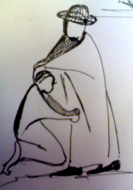August 2009

Ta kda ndo n’rezla’a man a tètèkè maya azbai.
(Mafa)On ne tue pas l’ignorant qui mendie la sagesse. (French)
Nobody kills an ignorant person who begs for wisdom. (English)
Mafa (Cameroon, Nigeria and Niger) Proverb
Background, Explanation, Meaning and Everyday Use
The Mafa people live in the Mayo Tsanaga region in Far North Cameroon, but they are also found in various other cities of northern Cameroon, northern Nigeria and recently southern Niger. They speak Mofa. In the traditional Mafa culture, begging (n’tètèkè) is severely condemned. For this reason even when someone offers a gift to a Mafa, he or she does not accept it right away. The donor has to insist once, twice or three times before he or she takes the donation. It is interesting to note that, to the best of our knowledge, it is only right to solicit a donation when there is famine. It is even more remarkable to observe that in this case people do not use the verb n’tètèkè (begging) but rather n’hèsh ma (which means literally to “to seek the mouth”). This indicates that in the culture begging is shameful and shame is the worst thing that can happen to a Mafa. Another proverb expresses this clearly by stating N’dza’a a horai a gèd a m’metsai that means Shame hurts more than death.”
The proverb Ta kda ndo n’rezla’a man a tètèkè maya azbai (Nobody kills the ignorant person who begs for wisdom) encourages to “beg for wisdom” in a context where begging is very shameful. It is in fact an encouragement to accept to follow the path of shame in order to get knowledge and wisdom (the same Mofa word maya applies to both). It means that instead of pretending that you know something and remaining ignorant, it is better to be humble enough to ask for information or to pursue knowledge even if it means lowering oneself in the process. This proverb is normally used in an embarrassing context where somebody does not know something that he or she is supposed to know.
Biblical Parallels
This Mafa proverb has clear parallels with biblical teaching. Many Bible verses encourage humility. The Bible says in Proverbs 11:12: “When pride comes, then comes disgrace, but with humility comes wisdom.” Here the relationship between humility and wisdom is clearly expressed although the context is different. In the same book the Bible teaches that “Before his or her downfall a person’s heart is proud, but humility comes before honor” (Proverbs 18:12). It is really interesting because out of pride humans hesitate to follow the path of humility and by doing that they lose the very honor that they try to keep. Just as the Mafa who refuses to “beg” for wisdom out of pride remains ignorant, a person who refuses to be humble will not get the true honor that wisdom gives. Instead of killing honor on the altar of pride, wise men and women should follow the teaching of the Bible that point to the greatness and nobility of humility. Isn’t it clear that Jesus-Christ, the Wisdom in person, gives us the perfect example of humility? The second chapter of Philippians that theologians call the “Christological hymn” is worthy of serious meditation during our quiet times.
Contemporary Use and Religious Application
 The following anecdote illustrates the contemporary use of the proverb mentioned above. A Mafa who was not familiar with the capital city (Yaoundé) lost his way in the big market. It was a very embarrassing situation. He told a shoemaker who seemed to be honest: “There is a saying in my culture that ‘nobody kills an ignorant person who begs for wisdom.’ Can you please tell me where I can get a taxi in order to return home?” The shoemaker smiled, stopped what he was doing, and was kind enough to guide him.
The following anecdote illustrates the contemporary use of the proverb mentioned above. A Mafa who was not familiar with the capital city (Yaoundé) lost his way in the big market. It was a very embarrassing situation. He told a shoemaker who seemed to be honest: “There is a saying in my culture that ‘nobody kills an ignorant person who begs for wisdom.’ Can you please tell me where I can get a taxi in order to return home?” The shoemaker smiled, stopped what he was doing, and was kind enough to guide him.
This proverb can also be used to encourage people who think that they are too old to continue to go to school or to learn new skills. People may make fun of those who are far above the average age of their classmates, but in the end they will get the diplomas and skills that will help them to better serve their fellow citizens and decently earn their living.
As Christians, no matter our spiritual or physical age, we must be humble enough to know that we need to learn from our spiritual leaders and fellow church member by regularly attending church services, Bible studies and teaching sessions. We must also be humble enough to seek prayer support, counseling or to ask questions on biblical teachings or Christian life to those who have studied the Bible more thoroughly.
Dr. Moussa Bongoyok
P.O. Box 40126
Pasadena, California 91114
USA
Email: bongoyok@yahoo.com
Professor Cephas Yao Agbemenu
Department of Fine Arts
Kenyatta University
P.O. Box 43844
Nairobi, Kenya
Cellphone: 0723-307992
Email: cyagbemenu@yahoo.com

